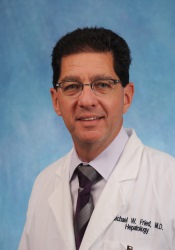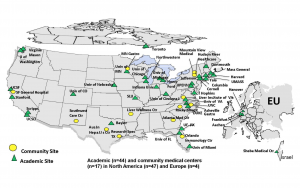
Michael W. Fried, MD, professor of medicine in the department of medicine’s division of gastroenterology and hepatology, has received the Food and Drug Administration’s Award for Regulatory Science Excellence for the Hepatitis C Therapeutic Registry and Research Network (HCV-TARGET) he co-founded in 2011. The award also recognizes HCV-TARGET as an outstanding public-private partnership that leverages real-world evidence to enhance the safety and effectiveness of direct-acting antivirals approved for chronic hepatitis C treatment.
HCV-TARGET is a consortium of 60 sites around the US and Europe, using innovative approaches related to bioinformatics, epidemiology, biostatistics, and health care data systems integration. Patients at participating sites are consented prospectively for participation. HCV-TARGET uses a centralized data abstraction process that minimizes burden on research sites and reduces data variability owing to difference in interpretation of medical records.
Prior to 2011, treatments required weekly injections with many side effects, and there was a 50% cure rate. Since then, oral treatment options have rapidly evolved and dramatically improved cure rates.

“In the beginning, we wanted to know how these oral drugs would perform in diverse groups of patients, such as those at the extremes of disease severity and in those underrepresented in phase 3 clinical trials,” said Fried, director of the UNC Liver Center.
Over 14,000 patients around the world are enrolled in the ongoing HCV-TARGET study that has generated multiple separate findings. Study data has been published in numerous publications and cited in guidelines of the American Association for the Study of Liver Diseases, the World Health Organization, and the European Association for Study of Liver Disease. Data has also been used for drug label expansion and safety surveillance.
David R. Nelson, MD, co-principal investigator of the study, manages the clinical coordinating center from the University of Florida, while Fried manages the data coordinating center at UNC. The UNC team includes Monika Vainorius, MD, associate director of the data coordinating center; Paul Stewart, PhD, statistician in the department of biostatistics in the UNC Gillings School of Global Public Health; and John Baron, MD, MS, MSc, in the division of gastroenterology and hepatology.
The collaboration has provided a robust platform for FDA scientists to utilize real-world data to inform the safety and effectiveness of direct-acting antiviral agents in the post-marketing period.
Fried estimates 170 million people worldwide are living with HCV, with approximately 4 million people in the US, and 120,000 people in North Carolina. He says the epidemiology is changing as the opiate epidemic increases the number of people with hepatitis C.
“Originally, we were seeing mostly baby boomers, but now we’re seeing a new wave of people with hepatitis C,” Fried said. “Every week I see people under the age of 30, who have become infected by drug injection. Fortunately, with the treatments we have now, there are 95% cure rates. When I started treating HCV in 1990, the cure rate was 7%. The big issue now is focused on getting the drugs to the people who need them.”
Fried is the primary author or co-author on more than 160 publications concentrated in the field of viral hepatitis. In addition to HCV-TARGET, he is co-chair of the NIH HBV Research Network. Most recently, he was appointed president of the American Association for the Study of Liver Diseases (AASLD) after serving four years on the governing board.